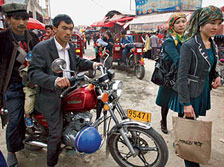 영어토론방 영어토론방 | Home>영어토론방 |
Diplomacy Encounter or Collision
페이지 정보

본문
 Topic_Society : Encounter or Collision
Topic_Society : Encounter or Collision In China's Wild West
By SIMON ELEGANT/KHOTAN_Time Magazine
In a visit to the region this month, TIME talked to Khotan farmers, impoverished jade hunters, shopkeepers, students and professionals. They say that the government discriminates against them in areas ranging from job opportunities to issues such as the teaching of the Uighur language, which has been heavily curtailed, and the issuance of international passports, which Uighurs now say has been halted until after the Olympic Games in August. (An official surnamed Wu at the Foreign Affairs Department in Khotan said he wasn't aware of such a policy.) Some Uighurs, who are a central Asian people ethnically much closer to Turks than Chinese, expressed fears that their culture and way of life could be threatened by a steady influx of Han Chinese. The wave of immigration has seen the Han share of the province's population — estimated at about 6% in 1949 — rise to an official 40%, a figure that is much higher if millions of undocumented migrant workers are included. That massive immigration has transformed the north of the province, effectively establishing a Han majority and helping to turn what might have been a base for a festering separatist problem into a race-relations issue. Just as Inner Mongolia, now 70% Han, has been Sinicized, so too are Xinjiang and Tibet being flooded with Chinese arrivals. In Tibet, the migration has been assisted by a $4.1 billion railway completed in mid-2006 that connects Beijing to Lhasa.
Cabinet Minister Posts Open to Foreigners
Dual Nationality to Be Allowed Selectively
By Kim Tae-jong, Jung Sung-ki, Staff Reporters
From October, foreign nationals will be eligible for cabinet minister posts and can apply for most other civil service posts. In addition they will no longer need to visit the Immigration Office to get permits for changing jobs inside Korea, instead they can inform the office of their job status online.
The National Competitiveness Reinforcement Special Committee said Wednesday that foreign nationals ― currently only able to work for public organization as contract workers ― will be able to apply for permanent positions.
The committee said it plans to invite foreign professionals to work as heads of public companies as part of steps to hone national competitiveness. Due to tight monitoring and cumbersome documentation requirements, Korea has underutilized talented foreign professionals for national development, he said.
The government plans to ease regulations and offer various incentives to foreign applicants following a decision made at a meeting of the justice, education and labor ministers at Cheong Wa Dae.
Questions
1. The two articles show different situations in each country.
The stories seem different but are sharing the same condition: Encounter(or collision) of different peoples.
This might be partial aspect of globalization. How do you think of globalization?
Explain your opinion on it in regard of your preference.
2. What can be the suggestions to protect the rights for Uighurs? Or, for rights of the weak against the strong?
(Think about the way to protect the rights keeping the mad cow disease crisis in mind.)
3. How do you think of this opening toward foreign populations by the government?
And are you quite open to the world?
Talk about what you think of the outside and the interactions with it given that Korea is inside.
4. What do you think is the right globalization for everybody?
What do you think we need to be eligible for to be a member of this global society?
이 글은「대학연합영어토론동아리」www.pioneerclub.com에서 제공하는 영어토론 정보입니다.
댓글목록
등록된 댓글이 없습니다.

